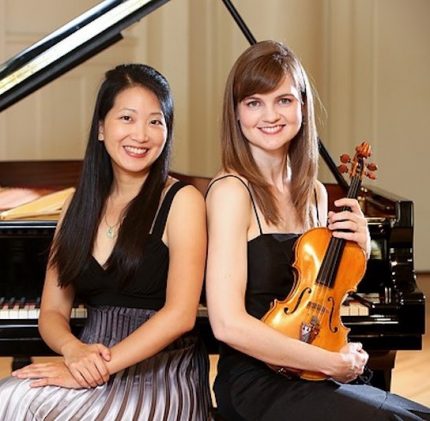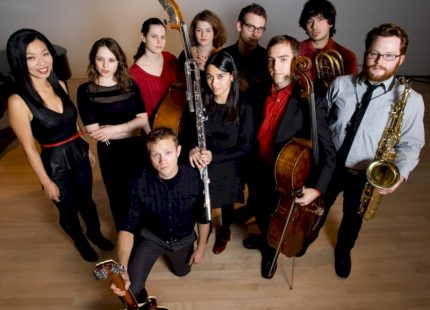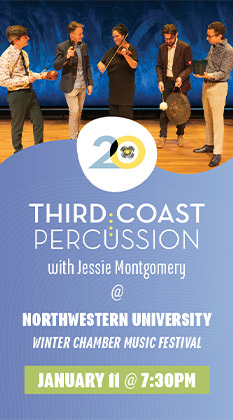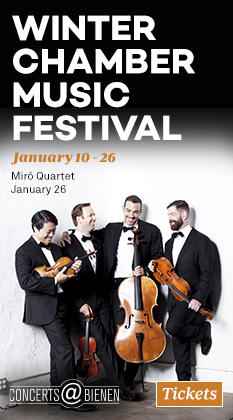Women artists take the spotlight at Ear Taxi Festival

A defining narrative of the last eighteen months has been one of leveling the playing field, whether in reference to universal fallout of the pandemic, reckoning with economic disparity, or confronting anew the nation’s troubled history of racial inequity.
Such themes could not be more timely for the Ear Taxi Festival, which in its second iteration has renewed its commitment to illuminating the broadest possible variety of new music endemic to Chicago.
Following two weeks of offsite performances, the festival made a respectable showing of that mission in the first of five marathon events that comprise the festival’s Mainstage series, which took place Thursday at the Kehrein Center for the Arts in the city’s Austin neighborhood.
The afternoon lineup, viewed via livestream, opened with colorful programs by Picosa and pianist Clare Longendyke, followed by Fonema Consort, whose advocacy of works by composers of Latin American heritage often yield interesting results.
Two such standouts rose to the surface in Fonema’s program on Thursday afternoon. Mathew Arrellin’s Umbra II presents an aural cloud of sibilance conjured by an ensemble of guitar, flute, soprano, and percussion that shift like a miasma. Arrellin’s work succeeded on the merit of its pacing, as did the sixth movement of Luis Fernando Amaya’s Studies for Bestiario, which completed the program.

Fonema’s opener, Eyes On by Kelley Sheehan, was stronger conceptually than in execution. Performed by a trio of woodwinds and electric slide guitar and electronics, the work deploys a vocabulary of static, amplified key clicks, and feedback woven into a strange and novel-sounding texture. Fonema’s approach to the work, however, came across as rather cautious, and the performance took on a meandering quality. Attentive camera work in the hall helped clarify the provenance of such musical gestures and added a layer of interest to the livestream experience beyond what would have been visible for an in-person viewer.
The program continued with flutist Lisa Goethe-McGinn, who delivered a uniformly strong performance in a collection of solo works by women composers including Augusta Read Thomas, Janice Misurell-Mitchell, and Goethe-McGinn herself. The flutist particularly excelled in Kyong Mee Choi’s Slight Uncertainty is Very Attractive, a searing work bolstered by a stunning electronic accompaniment that layered flute, strummed piano strings, and chimes into a swirling maelstrom. Goethe-McGinn closed the set with Regina Harris Baoicchi’s Autumn Night, a bluesy ballad for alto flute that delivered with all the melancholy and stylishness of a late-night street-corner busker.
The most consistently intriguing repertoire of the afternoon came from the ever-excellent Quince Ensemble. Ordinarily a vocal quartet that excels in large-scale works for the medium, Quince was represented on this date by just two of its members, Kayleigh Butcher and Liz Pearse, who offered a truncated program including works by Chicagoans LJ White and David Reminick.
The program of vocal solos and duets favored works in miniature, a welcome departure from the ensemble’s usual fare, but met with varying levels of success. Selections from Meara O’Reilly Hockets showcased the wonderful contrast in Pearse’s glassy soprano and Butcher’s burnished mezzo, not to mention serving as a vehicle for the duo’s finely tuned interplay.
By contrast, Adrián Montúfar’s Touch for solo voice — a short triptych that surveyed an array of percussive and largely vowel-less vocal sounds — had an étude-like quality that gave the impression of a sketchiness despite Butcher’s precise and thoughtful delivery.
Her Disappearance, a work for two voices by Bethany Younge and Butcher, fared better on the strength of its modus operandi: each musician sibilated, whispered, and sang into a five-foot PVC pipe, which both amplified and distorted the singers’ vocalizations. At its most ethereal, the singers’ voices activated the natural resonance of the tubes, enshrouding their ululating trills in a ghostly timbre like an otherworldly brass instrument.
The most fully formed of these works, Kari Watson’s solo Intonations I — heard here in its world premiere — also provided the greatest revelation of Quince’s offerings, in which Pearse was totally at home in the piece’s soaring glissandi, microtonal modulations, and seamlessly integrated extended techniques alike.
The Blue Violet Duo closed the mid-afternoon set with Amos Gillespie’s Spin-off, a well-crafted work in the vein of “American classical” whose four movements suggest a range of idioms from folk music to jazz. Violinist Kate Carter relished in the piece’s fiddle-tune flourishes and arcing, Copland-esque lines, while Louise Chan brought impeccable rhythmic drive and sensitive support from the keyboard throughout.
The Ear Taxi Festival continues daily through Monday. Eartaxifestival.com
Posted in Performances


